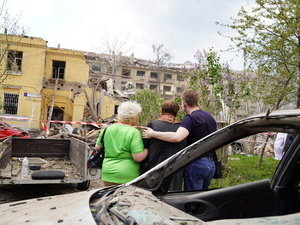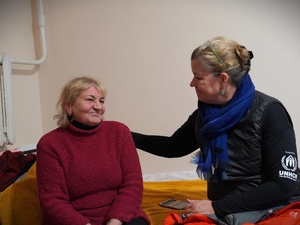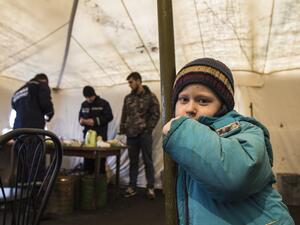Ingushetia: High Commissioner meets President Zyazikov
Ingushetia: High Commissioner meets President Zyazikov
High Commissioner Ruud Lubbers met yesterday with President Murat Zyazikov of the Republic of Ingushetia, Russian Federation. President Zyazikov was accompanied by Mr. Stefan Vassilev, the UN Resident Coordinator and acting Humanitarian Coordinator in Moscow on a visit to Humanitarian Agencies based in Geneva.
The discussion focused on the issue of the remaining 66,800 displaced people from Chechnya benefiting from safe haven in the neighbouring Republic of Ingushetia. The High Commissioner expressed concern over a recent announcement by Russian officials that the three remaining tented camps in Ingushetia, where several thousand IDPs are still sheltered, will be closed prior to presidential elections in the Russian Federation in March. If this happens without a realistic provision of any alternative shelter, then the principle of safe haven would be seriously jeopardized. Mr. Lubbers was reassured by President Zyazikov, who said he was personally committed to respecting the principle of voluntary return. The High Commissioner reiterated his wish to promote a positive engagement of the international humanitarian community through a two-pronged approach in which safe haven would be guaranteed in Ingushetia for those not wishing to return, while those returning to Chechnya of their own free choice would be supported by greater involvement and presence in Chechnya by humanitarian agencies.
The High Commissioner also raised the issue of the abduction of Arjan Erkel of Médecins Sans Frontières in Dagestan. He stated that the abduction overshadows the image of the North Caucasus region to which Ingushetia belongs and requested any possible intervention from the Ingush President.
As of 14 January 2004, a total of 66,792 internally displaced persons from Chechnya were registered for assistance in Ingushetia in the database of UNHCR's implementing partner, the Danish Refugee Council (DRC). Of this total, 7,069 people were registered in three tented camps, another 23,682 persons in temporary settlements and 36,041 persons in private accommodation.
On the issue of possible camp closures, UNHCR remains in close contact with the federal, Ingushetia and Chechnya authorities as well as NGOs and the displaced persons themselves. The authorities at all levels continue to assure us that all returns will be voluntary, and UNHCR protection staff continue to verify this on the ground. Since 1 January, some 345 IDPs have returned to Chechnya with the assistance of the Chechen Forced Migrants Committee.
Field staff report increased activity by the authorities in the camps, including representatives of the Chechnya administration. The major new element is their active soliciting of applications for compensation for destroyed housing and lost property in Chechnya. Planned at approximately US $10,000 per family, such compensation - if actually paid - would constitute a major incentive for return. Nevertheless, the authorities at all levels acknowledge that a number of IDPs will choose to remain in Ingushetia or elsewhere. While IDPs continue to cite insecurity in Chechnya as their primary reservation to return, the lack of shelter there is also a major constraint. Additional temporary accommodation centres (TACs) being prepared by the authorities in Chechnya will house only some 97 families. We are also concerned over a lack of adequate alternative shelter in Ingushetia should the tented camps be hastily closed. Some 415 rooms have been or are in the process of rehabilitation by NGOs in Ingushetia, of which IDPs have recently occupied 114. Obtaining the necessary permits from the Ingushetia authorities is difficult, however, so progress is slow. While UNHCR and DRC are verifying the actual number of families remaining in the tented camps, there is clearly not enough alternative shelter to accommodate them elsewhere on short notice.









